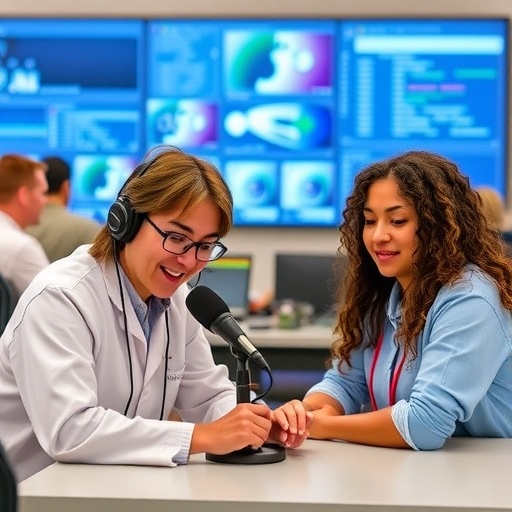In the rapidly evolving field of bioengineering, innovative approaches to education are becoming increasingly important. As the demand for skilled professionals in this discipline grows, educators are exploring various strategies to engage students meaningfully. One such approach that has gained attention is the utilization of podcasts as a motivational tool for bioengineering capstone students. This compelling idea has been brought to life in a recent study led by Golecki, Chang, and Johnson, published in Biomedical Engineering Education.
Podcasts, which have surged in popularity over recent years, represent a unique blend of convenience and accessibility, making them an ideal medium for educational content. The study highlights the potential of podcasts to transform the traditional educational landscape by bridging gaps in student engagement and professional readiness. In essence, the research posits that when students are exposed to real-world applications and narratives within the biomedical field, they become more motivated to explore and deepen their learning experiences.
The authors conducted a thorough investigation into the effectiveness of podcasts as a learning resource in an educational setting. By examining the experiences of bioengineering capstone students, they gathered invaluable insights into how audio content can enhance engagement and learning outcomes. This study is particularly significant as it seeks to align academic objectives with the interests and aspirations of students, effectively positioning podcasts as a catalyst for self-directed learning.
Throughout the research, students expressed that the informative nature of podcast episodes coupled with the excitement of hearing from industry professionals invigorated their interest in the field. The podcasts showcased a diverse range of topics, from groundbreaking research to career advice, providing students with a holistic view of what it means to work in bioengineering. Such comprehensive exposure is essential, as it not only enriches students’ academic understanding but also prepares them for the complexities of modern biomedical careers.
Furthermore, the interactive element of podcasts cannot be overlooked. Unlike traditional lectures, podcasts allow for reflection and discussion, providing an opportunity for students to digest information at their own pace. The flexibility of listening at their convenience fosters a more personalized learning experience, making education feel less like a chore and more like an engaging journey. The study notes that students reported increased retention of information when they engaged with material through auditory means, suggesting that podcasting might cater to various learning styles.
The narrative style of podcast episodes, often infused with personal stories and experiences, also resonates deeply with students. This approach humanizes the educational content, transforming complex technical concepts into relatable narratives. It encourages students to envision their futures within the bioengineering field rather than merely seeing it as an abstract academic pursuit. The emotional connection fostered through storytelling can be a powerful motivational factor, igniting students’ passions and aspirations for their impending careers.
Moreover, the authors identified how podcasts could help students form connections with professionals in the field. By featuring guest speakers who are established bioengineers or educators, students gain first-hand insights into the paths that can lead to successful careers. The direct engagement with practitioners serves as a reminder of the potential impact their work can have on society, further enhancing their desire to learn and innovate.
Importantly, the research emphasizes the substantial role of podcasts in highlighting interdisciplinary aspects of bioengineering. Many bioengineering challenges require collaboration across different fields, such as medicine, technology, and environmental sciences. By featuring a diverse array of expert guests, podcasts can illustrate these intersections, thus broadening students’ perspectives and encouraging them to think critically about their roles in the greater context of healthcare and technology.
Another critical insight from this study is the potential for podcasts to serve as peer learning tools. Students can create and share their own podcast episodes, which encourages deeper engagement with the subject matter. This peer-led initiative promotes teamwork, enhances communication skills, and fosters creativity, which are all vital competencies within the bioengineering industry. Such collaborative projects not only reinforce learning but also empower students to take charge of their education.
The integration of podcasts into the bioengineering curriculum represents a shift toward more engaging and tailored educational experiences. However, the authors caution that successful implementation requires careful consideration of content quality and relevance. It is essential to curate podcast materials that align with learning objectives and resonate with student interests. Educators must also be equipped to facilitate discussions around podcast content to maximize learning outcomes.
In conclusion, Golecki, Chang, and Johnson’s study sheds light on the transformative potential of podcasts in bioengineering education. By stepping away from conventional teaching methods and embracing this innovative medium, educators can create more dynamic and responsive learning environments. The findings indicate that podcasts not only motivate students but also prepare them for the multifaceted challenges they will face in their professional careers. As the educational landscape continues to evolve, the role of podcasts as a tool for engagement and exploration in bioengineering may be more significant than ever.
The future of bioengineering education could very well rest on such creative solutions that prioritize student engagement and the integration of real-world experiences. The challenge and opportunity lie in harnessing technology and innovative pedagogical tactics to cultivate a new generation of bioengineers who are not only knowledgeable but also passion-driven and career-ready in an ever-changing landscape.
Subject of Research: The use of podcasts to motivate bioengineering capstone students for learning and career exploration.
Article Title: Using Podcasts to Motivate Bioengineering Capstone Students Toward Learning and Career Exploration.
Article References:
Golecki, H., Chang, W., Johnson, B. et al. Using Podcasts to Motivate Bioengineering Capstone Students Toward Learning and Career Exploration.
Biomed Eng Education (2025). https://doi.org/10.1007/s43683-025-00207-4
Image Credits: AI Generated
DOI: https://doi.org/10.1007/s43683-025-00207-4
Keywords: Podcast, bioengineering education, student engagement, learning outcomes, career exploration.




